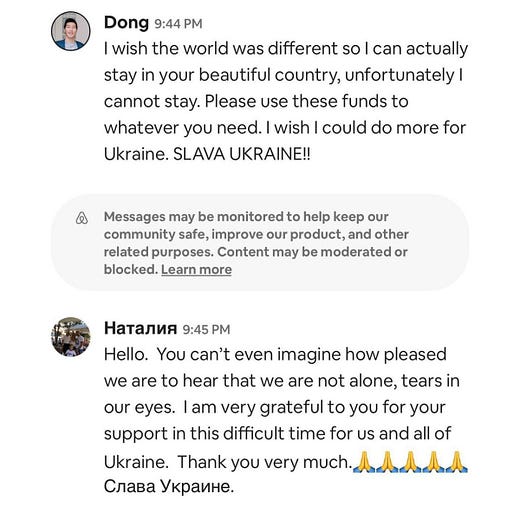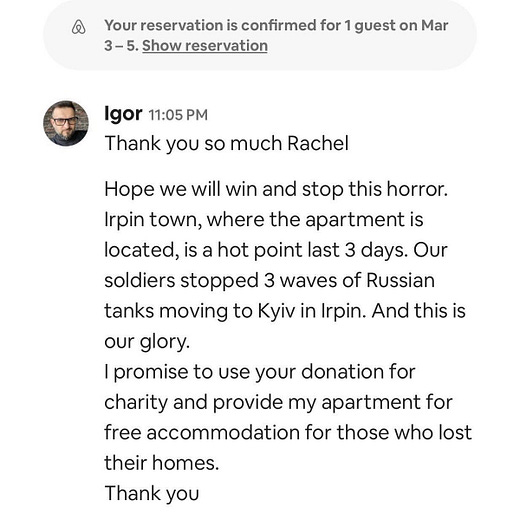Death in the Afternoon
Self-inflicted sanctions, where not to stay in Ukraine and the faux indignation of the righteous...
(Photo from Recoleta Cemetery, Buenos Aires. Source: Getty Images)
Joel Bowman, reckoning this Sunday from Buenos Aires, Argentina...
Cut off from global trade... vanquished from international credit markets... subject to severe capital controls... entire nationalized industries crushed...
Russia, 2022? Or Argentina for the better part of the 20th century?
How about... both!
The key difference, of course, is that while it is the enlightened elites in liberal, western democracies tightening the screws on Mother Russia (more about which in a second), the Argentines settled for what those in the soccer world call an “own goal.”
That is to say, when it came to imposing punitive sanctions, the Argentines didn’t wait for meddlesome outsiders to get the job done. “If anyone’s going to be doing any sanctioning around here, it’ll be us!” declared the proud porteños, right before administering seven decades worth of self-inflicted economic pain and misery.
But before we get to all that...
We returned home yesterday from our morning stroll to discover that dear wifey had booked us an Airbnb stay... in Kyiv, Ukraine. Now, we’re all for contrarian thinking, and we’ve seldom ever met a queue we wanted to join, but this seemed a bit extreme, even to us.
Knowing better than to wait for one of her husband’s ill-timed “just askings,” wife Anya went on to explain...
“It’s a way to support Ukrainians. You book a stay in one of their private listings... a day, a week... whatever. Obviously you don’t actually check-in or anything. But all the money goes directly to the host just the same. Airbnb has even waived its fees and charges. And they have verified ‘superhosts,’ who have been around a while, to help ensure the account owners really are who they say they are...”
We had a look. And, yep... it’s a thing. Indeed, Kyiv has fast become the hot new place not to be seen, with people around the world paying good money not to stay in the bombarded capital.
Within a couple of days, well-meaning folks booked over 60,000 nights accommodation all over Ukraine, the vast majority of whom will never set foot in the country. That’s 164 years of non-vacation time, raising almost $2 million for thousands of hosts, many of whom don’t even have a roof over their own head.
Seems like a decent workaround... and we’re all for private solutions to public problems. “Perhaps we should look into not going to Moscow, too?” we wondered aloud. “And while we’re at it, how about not staying in St. Petersburg, too?”
Alas, Airbnb has suspended operations in Russia (and Belarus), marching lockstep with Booking.com, General Motors, Boeing, Google and a slew of righteously indignant western corporations.
But wait...surely private citizens in Russia and Belarus are victims here, too? War doesn’t decide who is right, as the old saying goes, only who is left. Do these countries not have a single brave firefighter? Not one honest kindergarten teacher? Nobody who ever helped a scared kitten out of a tall tree? Is there not a nurse in the land who dutifully administered a covid vaccine, a scientist who delivered a global warming speech, a Marxist academic who published a paper about intersectionality?
What, not one “ally” in the whole place? Nobody “doing the work”? None who gives a fig about Black Lives? How DARE they?!
Of course, if Putin really is a sociopathic monster, who cares naught for human suffering, surely economic sanctions that punish ordinary Russians are hitting him precisely where it doesn’t hurt. The man has been in power for almost a quarter of a century last we checked. It’s not as if he answers to voters or lies awake at night fretting over approval ratings. So what if a few proletariat pensioners lose their retirement investments or have to stand in line while their metrocards don’t work? What does paper money matter to a man who has a whole state at his disposal... who deals not in diversity quotas but in square miles of occupied territory... a man who looks in the mirror and sees not a fierce ogre, but a duty-bound liberator?
If Vladimir Vladimirovich Putin entertains delusions of historical grandeur, like the long line of crackpot dictators and military strongmen before him, it’s unlikely his motivations will be derailed by snide remarks from the bluechecks on Twitter, much less the faux, posturing outrage emanating from narcissistic influencers on Instagram. He probably doesn’t even care what Stevie Nicks thinks of him (if he even knows who she is), to say nothing of Hunter Biden’s dad and Bill Clinton’s wife. Heck, he probably doesn’t even care that Joy Behar wasn’t able to take her planned vacation to Italy. “First the pandemic, and now this?!” The nerve!
As for Belarus, we stayed in an Airbnb in the capital, Minsk, a few years ago (before it was cool not to not to do so). The apartment was comfortable enough and the hostess, a bright young psychology student, was perfectly convivial. But the city? Drab. Bleak. Brutalist. The place was practically designed to appear next to the word “sh!thole” in the dictionary. For years the poor citizens there have been terrorized by their commander, Alexander Lukashenko, the “Last Dictator in Europe.” And when they do speak up - bravely, not from the comfort of their gilded clawfoot bathtubs in Malibu mansions - the consequences are unambiguously dire. Dissidents disappear. Demonstrators are punished severely and opposition candidates are arrested, beaten... and worse.
The world is full of cheap and simple-minded narratives. Carbon? Bad. Dr. Anthony Fauci? Good! Red meat? Bad. Trans swimmers? Good! Diversity of opinion? Bad. Diversity of people holding the same, pre-approved opinion? Good!
Now that the great covid scare has receded from the headlines (where is Netflix’s most trusted medical advisor, by the way?), the collectivists yearn for a new opportunity to prove their righteousness and showcase their own unblemished souls.
In our haste to cast roles in the next geo-drama, let’s not reflexively mistake every Olga and Mikhail for one of “the baddies,” lest we begin rounding up people by the emblems on their passports and detaining them in government internment camps... you know, the kind of thing that would only ever happen “over there.” Right? Riiight?
Meanwhile, when we’re not staying in “deluxe 2 bedroom close to arena” in countries we’ve never been to, we like to spend time here, in Argentina’s capital. As mentioned in this space before, what this place doesn’t know about bone-headed economic blunders and self-inflicted wounds isn’t worth knowing.
Which brings us to this week’s essay...
Death in the Afternoon
By Joel Bowman
To be immortal is commonplace; except for man, all creatures are immortal, for they are ignorant of death; what is divine, terrible, incomprehensible, is to know that one is immortal.
~ Jorge Luis Borges
Everything is illuminated against its opposite; truth against fallacy; light against darkness; life against death. And who would have it any other way, even if they could? What would life on this mortal coil be, for instance, without the eternity of its terminally mysterious counterpoint?
If there exists a perfect setting for these and associated meditations, it must surely be the magnificent Recoleta Cemetery, located right here in Buenos Aires. On any given weekend, this sacred resting place for thousands of the city’s most famous – and infamous – people is found to be one of the liveliest places in town. Notable interments include a who’s-who list of Argentine writers, painters, poets, musicians, scientists and luminaries from other noble fields of interest. And, because nothing, including death, is beyond the law of equilibrium, a handful of politicians also rot underfoot.
Tourists pour in to adorn Maria Eva Duarte de Perón’s grave with flowers, for instance, bypassing the resting place of a Nobel Prize-winning chemist and a dozen honest writers to do so. Other, temporary attendees pose with Colgate smiles to have their picture taken beside weeping cement angels, frozen, as they are, in a state of perpetual sorrow. Young boys give the “peace” symbol next to the generals’ tombs whose armies laid to waste to tens of thousands of men, not much older than they, the bodies of whom are long forgotten, their makeshift graves unmarked.
Nowhere does irony live a fuller life than in a cemetery.
Walking among the deceased, reading bookend dates on the bronze plaques, one is reminded of the finite nature of all things; organisms, currencies, political regimes, class structures. When the cemetery was constructed, back in 1822, it must have been a good ride from the exclusive barrios of San Telmo and Montserrat. The rich probably wouldn’t have been caught dead around the grounds of the Monks of the Order of the Recoletos, nor near the shabby, patchwork graveyard that was built there the same year the group disbanded.
Half a century later - and with Argentina still reeling from the War of the Triple Alliance and its own, subsequent civil war - a yellow fever epidemic tore through the capital city. Its wealthier, southern quarters were among the worst hit areas. Death toll estimates range from thirteen to twenty-five thousand. The clase alta packed up and moved north, largely into and around the Recoleta barrio. As such, the marbled vaults came to be populated with members of this same aristocracia, who, though they escaped the fever, came to rest here eventually just the same.
Today, you could buy an entire building in San Telmo for the same price as some of the finely appointed homes in Recoleta. An entire block in Montserrat might go for half that much.
And so it goes. People die…cities and empires crumble to the ground…and time, indifferent to the fleeting anguishes and triumphs of men, presses on.
At the turn of the 20th century, Argentina was ranked as the 8th most prosperous nation on earth. Only Belgium, Switzerland, Britain and a handful of former English colonies - including the United States – were more favorably positioned, economically. In 1913, Argentina’s bustling, cosmopolitan capital, Buenos Aires, had the thirteenth highest per capita telephone penetration rate in the world. Her per capita income was, around this time, 50% higher than in Italy, almost twice that of Japan and five times greater than its northern neighbor, Brazil. Argentina’s industry churned out quality textiles and leading edge, refrigerated shipping containers carried her prized beef, first introduced in 1536 by the Spanish Conquistadors, from the fertile plains of the pampas to the farthest reaches of the known world.
As the century wore on, protectionist policies at home and increased competition from the export-led, post-WWII economies – particularly from Japan and Italy – undermined Argentina’s international advantage. From 1900 through to the beginning of the new millennium, Argentina’s real GDP per person grew at a rate of 1.88% per year. Brazil outpaced her handily, clocking a 2.39% annualized growth rate. Japan, starting with a real GDP per person of just over $1,500 (2006 dollars) at the turn of the twentieth century, grew an average of 2.76% per year. By the middle of last decade, Japan’s real GDP per person had doubled that of Argentina. By 2020, it was more than quadruple.
The phenomenon is so conspicuous, the local Argentines even have a joke for it. “There are four types of countries in the world,” they lament. “First world. Third world. Japan, where nobody can figure out how they did so much with so little. And Argentina, where nobody can figure out how we did so little with so much.”
War, currency debasement, civil unrest, military rule and the catalyzing agent of political aspiration, harbored by the equally corrupt and inept, all conspired to stultify this once-proud nation’s potential. The great Argentine poet and essayist, Jorge Luis Borges, described one such retarding factor with characteristic flare and wit: “The Falklands thing was a fight between two bald men over a comb.”
On a comfortable Sunday afternoon in late February, an elderly group of well-dressed gentlemen met at their favorite restaurant, right by the gate to the Recoleta Cemetery, for lunch. They took a table outside, one in the shade and with a view of the passing foot traffic. The waiters, having brought the regulars the same thing, more or less, every Sunday for as long as they could remember, immediately set about filling their table. There was bife de lomo and chorizo sausages, mozzarella and buffalo tomatoes and papas fritas by the pile. Rich, Argentine Malbecs and Cabernets flowed freely and the merriment of the group soon became infectious. They flirted with the pretty waitresses and joked with patrons at the nearby tables.
After more than a few bottles, one of the gentlemen got chatting with an Australian editor of no particular importance.
“I am a judge here,” he eventually told the younger man. “My friends and I have seen it all in this city…riots, economic crises, war, people’s entire life savings wiped out overnight.”
One of his friends lent over and placed a knowing hand on the judge’s shoulder. “Today, we enjoy the moment,” he said to his lifelong friend, before adding, one long finger pointed over the cemetery wall, “because tomorrow…ha ha…well, you know our next stop old man.”
And the table erupted in laughter, as the sun set over the angel’s heads in the background.
Cheers,
Joel Bowman








Man, that’s some good shit. Great thoughts and even better writing. The value of this Substack is just fantastic.
Hi Joel, I am greatly enjoying your writing, which I was ignoring until I happened to read one a few days ago, but I have a question (which maybe you have already answered). Why on earth are you living in Buenos Aires or anywhere in Argentina?